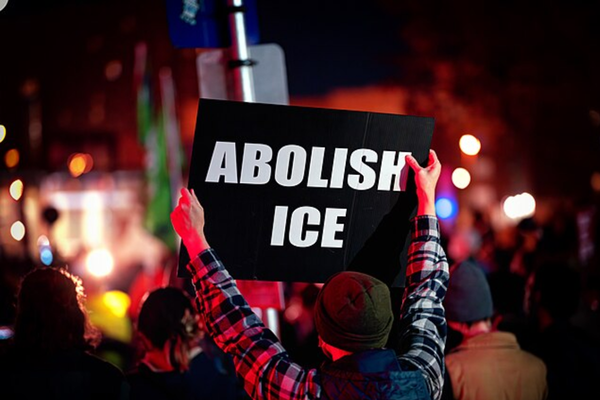“IT is going to be a little weird,” Patrick Harvie says, as he ponders a future outside of the top job in the Scottish Greens after 17 years.
Speaking with less than a day to go before the polls closed to fill the positions of the party’s two co-leaders, the Glasgow region MSP admits it is the “end of an era”.
Harvie has been an MSP since 2003, is the Greens' longest-serving parliamentarian, and was the first from his party to hold a ministerial position, alongside Lorna Slater.
Slater, fellow MSPs Ross Greer and Gillian Mackay, as well as activist Dominic Ashmole, will find out on Friday which two will be leading the party into the next election.
Harvie isn’t stepping back from politics completely – topping the list for the party’s Glasgow regional list once again, and setting his sights on contesting the next Holyrood election. He insists that challenges from activists to oust him from the top spot were “overblown”.
In his last interview as co-leader, Harvie sat down with the Sunday National on the grass outside of the Botanic Gardens greenhouse in Glasgow’s west end to reflect on his time at the helm.
When I arrive, he’s snacking on a pie and flicking through former first minister Nicola Sturgeon’s memoir, Frankly, which he tells me he has just bought. Unsurprisingly, the former SNP leader merits a mention during the interview when we discuss transgender rights.

Taking a back seat
WHEN I ask Harvie what advice he would offer to whoever wins the co-leadership contest, he says he will try to “resist” becoming a backseat driver and let the new top team get on with the job.
“The last thing I want to be is our equivalent of Fergus Ewing, standing up on the back benches and getting red-faced and angry about everything my own party is doing,” he said.
“That's not who I'm going to be.”
“I'm looking forward to being a kind of loyal lieutenant for whoever the new leadership team are,” Harvie explains, having declined to endorse any of the candidates while the internal elections were under way.
“It probably will take little getting used to, but I'm pleased to be doing it at a time when we seem pretty well-placed for the next election.
“I mean, the strongest when we were in government and took a little bit of a dip after that, but it's built up again since then.
“It feels like I'm doing this at a time that's good for me and good for the party.”
Harvie laughs when I ask how he feels relinquishing control by stepping back from a position he’s held for such a long time, first as co-convener in 2003, before the title changed to co-leader in 2019.
“It’s not so much about giving up control, we’ve always been an extremely decentralised party,” he says.
“It's never been a sort of top-down dictatorial control type of organisation.
“It's probably going to be valuable for a new team to come in and set a direction, set a tone for the party, ahead of that election.
“I still have a voice, like every other party member, so it doesn’t feel like I’m giving up control, that would be the wrong phrase, I’m taking on a different role.”

Making Greens electable
AT the first Holyrood elections in 1999, the Greens returned one MSP, Robin Harper. By 2003, they had seven, including Harvie. The party took a hit at the 2007 election and dropped down to only two MSPs, before continuing to improve on their numbers ever since.
Polling suggests the party could pick up a record number of MSPs at the Holyrood 2026 election. In July, one poll suggested they could pick up 15% of the vote on the regional list, and potentially return 16 MSPs.
This growth, and making Greens a serious contender in Scottish politics, is what Harvie says he hopes defines his time in charge.
“In the early days, the thing we heard most often was: I like what you stand for, but you’ll never get in, so I’m going to vote for someone else,” he says.
“I think that has changed, not just showing that we can get Greens elected in every part of Scotland, both locally and in the Scottish Parliament, but particularly in this session, showing that we can actually deliver Green policies, that Green policies can make an impact,” he says.
Pointing towards a row of Glasgow tenements overlooking the Botanic Gardens, Harvie brings up the rent freeze he brought in while tenants minister in the Scottish Government. “There'll be people living in that building who've saved thousands of pounds and avoided rent hikes because of the rent freeze that we got through,” he says.
Harvie says that those who vote for the Greens now are “not just sending a signal about what they stand for”.
He adds: “They're choosing a program that will be put into practice, or as much of it as possible. I think that's the most important thing that we've changed over the last couple of decades.”
When Harvie was elected in 2003, he became the first openly bisexual MSP to sit in the Scottish Parliament. Since then, Holyrood voted to make gay marriage legal in 2014, but in recent years, there has been a significant pushback against LGBT+ rights.
The Gender Recognition Reform (GRR) bill, which would have allowed transgender people to self-identify rather than go through the existing lengthy process, was passed with cross-party support, but blocked by Westminster. In the years since, the SNP dropped plans to ban conversion practices, while any suggestions of recognition for non-binary Scots have dropped completely off the agenda, despite being long promised.
I asked how looking back at his decision to be open about his sexuality when he first stood for election how he feels about it in the current political climate.
“It's extremely mixed feelings, to be honest,” he says.
“It didn't even occur to me when I first stood that I shouldn't just be open and honest about who I was.”
Harvie worked at a gay men’s project in Glasgow before standing for election, including his role on his election leaflets, something he said felt “completely natural”.
“I know now that there are more people who would think twice about doing that than even more than 20 years ago,” he said.
“Progress is not a straight line, and the progress that had been made for decades and continued to be made for decades under devolution is not just at risk now, it is openly being undermined.”
The push against LGBT+ rights and minority groups is “terrifying”, Harvie says, adding that some on the Tory benches in Holyrood seem determined to stoke the fires of division.
“I think in some ways, the younger generation growing up carrying that kind of abuse around in their pockets on the device that's supposed to keep them connected to their friends and their family and their community – I can't imagine what that must be like for young people growing up at the moment.”
When I turn the conversation back to the GRR reforms, that undoubtedly galvanised the anti-trans rights movement, I ask what he thinks could have been done differently. Glancing at Sturgeon’s book, lying on the grass beside him, Harvie prefaces what he’s about to tell me by insisting he doesn’t want it to “sound like a dig” against the former first minister.
In interviews following her memoir, Sturgeon has said that looking back, she should have paused the reforms and slowed down.
Harvie says that while he believes Sturgeon is “sincere” in her support of trans rights, “slowing down is what caused the problem”.
“This was one of the most widely and repeatedly consulted on, debated, scrutinised pieces of legislation, and it was the slowing down and the stopping that allowed the transphobic campaign against it to galvanize and gather pace,” he said, noting that the reforms were first proposed at the 2016 election, and had the backing of all five Holyrood parties.
“It should just have been done. And the slowing down and the pausing to pacify or try and buy off the opposition of particularly some transphobic voices when the SNP are what caused the problem. If that hadn't been done, this would have been legislated for. It would have been passed into law, and much like the many other countries have already done this, the sky would not have fallen in.”

Independence referendum
WITH 17 years at the helm of one of Scotland’s pro-independence parties, it was not a complete surprise that when I asked Harvie what moment stuck out to him over that time, he pointed to the 2014 referendum. He argues that it “profoundly” changed the political conversation in Scotland, and voices frustration that that “kind of tangible opportunity to make meaningful choices has felt more distanced from people”.
He insists that the conversation around independence is “keeping itself alive”, but that the rise of the far-right and Nigel Farage’s Reform UK should be a warning to politicians that voters need to have a vision to vote for.
“We need to recognise that a kind of timid, centrist, steady as she goes approach in the midst of social, economic and environmental crises is what's giving the opportunity to the far-right, so that timid approach to politics is not something we can allow,” he says.
Harvie argues that while the results of the referendum were clear – 55% No and 45% Yes – there are still questions about Scotland’s future that have been left “unanswered”. Successive Westminster governments, he adds, have “undermined devolution” and that the parliament Scottish voters called for in the 1997 referendum is not what is in existence today.
“If you think about the kind of stuff that we do need to do if we're going to take the political opportunity and momentum away from far-right anti-democratic forces, we have to demonstrate that we can actually make genuine, bold, ambitious change happen in this country,” Harvie says.
“The limits of devolution at the moment, they constrain far too much of that.”
With John Swinney’s independence strategy urging voters to back the SNP on both the constituency and regional list, I ask Harvie how he feels about this, and if the First Minister is taking a risk with this approach, could independence be off the agenda if the SNP lose?
Harvie says he can’t condemn another party for trying to get votes in an election. “That’s political self-interest, there’s nothing wrong with that,” he adds.
“I think the danger of saying that only a vote for the SNP is counted when you're judging the attitude of the electorate to independence, I think that would be baffling.
“It would be almost as though the Union has said, unless one of their parties gets 50%, then the Union is over. No-one would take that seriously.
“We have to look at how everybody votes.”







